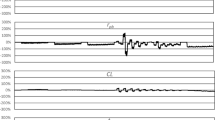Abstract
Log-linear procedures have been recommended for analyzing data that are in the form of counts or frequencies (Iacobucci and McGill 1990). In its current form, the recommended procedure does not deal with multiple response data (i.e., more than one thought per response category). The paper proposes analytical modifications that researchers need to consider when fitting models with this type of data. The problems and recommended modifications are illustrated with two distinct data sets. The first involves consumers' attribution responses to negative word-of-mouth communication about a brand whereas the second pertains to consumers' cognitive responses toward an advertisement. Results in each case indicate that researchers may generate erroneous conclusions about the significance of estimated parameters if the recommendations are ignored.
Similar content being viewed by others
References
Abelson, Robert P., John Leddo, and Paget H. Gross. (1987), 'The Strength of Conjunctive Explanations,' Personality and Social Psychology Bulletin, 13(2), 141–155.
Bishop, Yvonne. M. M., Stephen E. Fienberg, and Paul W. Holland. (1975), Discrete Multivariate Analysis: Theory and Practice, Cambridge: MIT Press.
Hilton, Denis J. and Joseph M. Jaspars. (1987), 'The Explanation of Occurrences and Non-occurrences: ATest of the Inductive Logic Model of Causal Attributions,' British Journal of Social Psychology, 26, 189–201.
Hilton, Denis J., and Ben R. Slugoski. (1986), 'Knowledge-Based Causal Attribution: The Abnormal Conditions Focus Model,' Psychological Review, 93, 75–88.
Iacobucci, Dawn and Ann L. McGill. (1990), 'Analysis of Attribution Data: Theory Testing and Effects Estimation,' Journal of Personality and Social Psychology, 59(3), 426–41.
Kelley, Harold H. (1967), 'Attribution Theory in Social Psychology,' in D. Levine (Ed.) Nebraska Symposium on Motivation, 15, Lincoln NE: University of Nebraska Press, 192–238.
Kelley, Harold H., (1972), 'Causal Schemata and the Attribution Process,' in E. E. Jones, D. E. Kanouse, H. H. Kelley, R. E. Nisbett, S. Valins, and B. Weiner (eds.), Attribution: Perceiving the Causes of Behavior, Morristown, NJ, General Learning Press.
Kelley, Harold H., (1973), 'The Processes of Causal Attribution,' American Psychologist, 28(2), 107–128.
Laczniak, Russell N., Thomas E. DeCarlo, and Carol M. Motley. (1996), 'Retail Equity Perceptions and Consumers' Processing of Negative Word-of-Mouth Communication,' Journal of Marketing Theory and Practice, 4 (Fall), 37–48.
Leddo, John, Robert P. Ableson, and Paget H. Gross. (1984), 'Conjunctive Explanations: When Two Reasons Are Better Than One,' Journal of Personality and Social Psychology, 47(5), 933–43.
Park, C. Whan and S. Mark Young. (1986), 'Consumer Response to Television Commercials: The Impact of Involvement and Background Music on Attitude Formation,' Journal of Marketing Research, 23 (February), 11–24.
Richins, Marsha L. (1984), 'Word of Mouth Communication as Negative Information,' in T. Kinnear (Ed.) Advances in Consumer Research. Provo, UT: Association for Consumer Research, 697–702.
Rust, Roland T. and Bruce Cooil. (1994), 'Reliability Measures for Qualitative Data: Theory and Implications,' Journal of Marketing Research, 31 (February), 1–14.
Teas, R. Kenneth and James C. McElroy. (1986), 'Causal Attributions and Expectancy Estimates: A Framework for Understanding the Dynamics of Salesforce Motivation,' Journal of Marketing, 50 (January), 75–86.
Wong, Paul T. P. and Bernard Weiner. (1981), 'When People Ask 'Why' Questions, and the Heuristics of Attributional Search,' Journal of Personality and Social Psychology, 40 (April), 650–53.
Wright, Peter, L. (1980), 'Message-evoked Thoughts: Persuasion Research Using Thought Verbalization,' Journal of Consumer Research, 7 (September), 151–175.
Author information
Authors and Affiliations
Rights and permissions
About this article
Cite this article
DeCarlo, T.E., Laczniak, R.N., Azevedo, K.A. et al. On The Log-Linear Analysis Of Multiple Response Data. Marketing Letters 11, 349–361 (2000). https://doi.org/10.1023/A:1008189229857
Issue Date:
DOI: https://doi.org/10.1023/A:1008189229857




